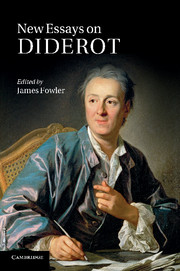Book contents
- Frontmatter
- Contents
- Notes on contributors
- Acknowledgements
- List of abbreviations
- Introduction
- PART I DIDEROT THE PHILOSOPHE
- PART II NOVELS
- PART III DIALOGUES
- PART IV PLAYS AND DRAMATIC THEORY
- PART V MUSIC, PERFORMANCE, AESTHETICS
- 14 Diderot's voice(s): music and reform, from the Querelle des Bouffons to Le Neveu de Rameau
- 15 Diderot and the aesthetics of the libretto
- 16 Ekphrasis and related issues in Diderot's Salons
- Select bibliography
- Index
- References
14 - Diderot's voice(s): music and reform, from the Querelle des Bouffons to Le Neveu de Rameau
Published online by Cambridge University Press: 11 April 2011
- Frontmatter
- Contents
- Notes on contributors
- Acknowledgements
- List of abbreviations
- Introduction
- PART I DIDEROT THE PHILOSOPHE
- PART II NOVELS
- PART III DIALOGUES
- PART IV PLAYS AND DRAMATIC THEORY
- PART V MUSIC, PERFORMANCE, AESTHETICS
- 14 Diderot's voice(s): music and reform, from the Querelle des Bouffons to Le Neveu de Rameau
- 15 Diderot and the aesthetics of the libretto
- 16 Ekphrasis and related issues in Diderot's Salons
- Select bibliography
- Index
- References
Summary
Le titre de musicien ne me va plus. Il y a cinq ou six ans que j'ai perdu le peu de voix que j'avais, pour la raison que nous ne pratiquons pas en France la méthode de la faire durer autant qu'en Italie.
(‘The term “musician” no longer suits me. Five or six years ago, I lost what voice I had, because here in France we do not observe the practice which conserves it, as they do in Italy.’)As a topic which straddles the domains of physiology, psychology and linguistic communication, the voice has been recognised in recent decades as an essential matrix for Western thought, partly because it is irreducible to words, whether written or spoken. By necessity, the voice is also central to early modern writings on music, for it is one area where nascent French musicography situated the specificity of music over language, as well as the articulation of the one to the other. Indeed, whilst the famous quip of Fontenelle – ‘Sonate, que me veux-tu?’ (‘Sonata, what do you want of me?’) – repudiated purely instrumental music as unintelligible, because it was devoid of verbal language which alone could carry signification, so instrumental music was in turn theorised by analogy with song, itself described and analysed according to characteristics of the voice, such as accent and pitch.
- Type
- Chapter
- Information
- New Essays on Diderot , pp. 203 - 219Publisher: Cambridge University PressPrint publication year: 2011



